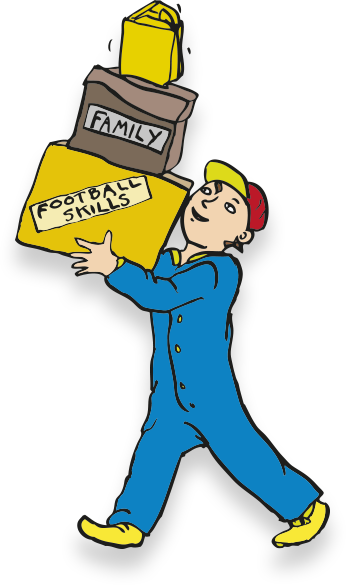

Safeguarding Policy
Subconquest Ltd Safeguarding Policy
This policy applies to anyone working for or on behalf of Subconquest Ltd or using the Ollie approach including staff, supervisors, coaches and trainers.
The purpose of this policy:
- Protect anyone who comes into contact with Subconquest Ltd from harm or abuse.
- To provide anyone working on or behalf of Subconquest Ltd or using the Ollie approach with the overarching principles that guide our approach to child protection.
- This policy applies to anyone working for or on behalf of Subconquest Ltd or using the Ollie approach.
Legal Framework
- This policy has been drawn up on the basis of legislation, policy and guidance that seeks to protect children in England, Northern Ireland, Scotland and Wales. A summary of the key legislation is available from nspcc.org.uk/learning
Subconquest Ltd is committed to the welfare of children and young people. We believe that they have a right to feel safe and be protected from neglect or abuse of any kind: neglect, emotional, sexual or physical.
We recognise that:
The welfare of the child or young person is paramount as enshrined in the Children Act 1989, Children Act 2004 and relevant government guidance- Working Together to Safeguard Children 2023 and The Prevent Duty Guidance
- All children and young people irrespective of age, race, gender, sexual orientation or identity, disability or religious beliefs have a right to equal protection from harm and abuse.
- Some children and young people may be more vulnerable than others because of their previous experiences, their level of dependency, communication needs or other issues.
- Working in partnership with the individual, the parent or carer(s) and other agencies is essential in safeguarding the welfare of children and young people.
At Subconquest we:
- Promote equality and diversity and inclusion and recognise that everybody has an equal right to be protected from prejudice, harm or abuse.
- Recognise that the welfare of children is paramount.
- Ensure child-centred approaches promote equality.
- Take seriously and respond promptly to any reports of prejudice, bullying, harassment or safeguarding concerns.
- Ensure that everyone feels valued, respected and heard.
- Celebrate and value the uniqueness of every child that we work with.
- Provide services that are accessible, respectful and tailored to the diverse needs of the children that access our services.
- Promote inclusive, respectful environments that are free from discrimination, harassment and bias for everyone who works within or accesses our organisation and services.
- Are dedicated to providing accessible services to all children, regardless of their background and circumstances, age, disability, gender, race, religion or belief or sexual orientation.
- Ensure our services are designed to be accessible and inclusive, promoting the wellbeing of every child, and work to eliminate barriers that may hinder access to our services.
- Promote our values and set clear standards of expected behaviour as set out in the Code of Conduct, Ethics and Professional Practice.
- Are committed to the continuous improvement of our safeguarding, equality and diversity practices.
Subconquest Ltd will seek to keep children and young people safe by:
- Valuing, respecting and hearing what the individual says.
- Working within this policy and those of any organisation that we have a contract with
- Supporting, supervising, monitoring and evaluating anyone working on or behalf of Subconquest Ltd or using the Ollie approach so that they all know about and follow our policies and procedures confidently and competently
- Ensuring anyone working on or behalf of Subconquest Ltd or using the Ollie approach are suitably qualified, insured and have undergone the relevant checks including ensuring the appropriate criminal record and reference checks are undertaken
- Ensuring anyone working on or behalf of Subconquest Ltd or using the Ollie approach has had safeguarding training to a minimum of Safeguarding children level 2 or equivalent child protection training renewed annually at a minimum; and understand their role and responsibilities regarding safeguarding matters.
- When working in an educational setting all Coaches will have read Keeping Children Safe in Education for: for schools and college staff (Part 1) Keeping Children Safe in Education 2024 Part 1
- When working within a school or other organisation Ollie Coaches will ensure they are familiar with and follow the school or organisation’s safeguarding and child protection policies and procedures.
- Recording, storing and using information professionally and securely, in line with data protection legislation and guidance.
- All Ollie Coaches are offered annual safeguarding updates and organisation specific safeguarding webinars to embed safeguarding practice led by Catherine Irving Consultancy Ltd.
- All Ollie Coaches will share any concerns promptly with the relevant person locally in their private practice or in the partner organisation; including the child and parents if appropriate.
- All Ollie Coaches discuss any concerns related to safeguarding as an ongoing aspect of their supervision with information and safeguarding logs being recorded on a secure Subconquest Database, which is shared with and reviewed by the Designated Safeguarding Lead (DSL) and Catherine Irving Consultancy Ltd.
- Ensuring confidentiality and the limits to it are clearly explained to those involved.
- Work within the terms of the service level agreement with the partner organisation.
- Maintain safe working practice when working with clients online and be aware of safer working guidelines and confidentiality.
- Ollie Coaches have access to DSL and Supervisors during hours of work that enable any safeguarding concerns to be reported from any session – both face to face or online. All concerns and allegations of abuse will be taken seriously, responded to appropriately and referred on as necessary.
This policy should be read alongside our organisational policies and procedures including:
- Code of Conduct, Ethics and Professional Practice
- Ollie Registered Practitioners policy and framework
- Safer recruitment policy and procedures
- Safeguarding and Child Protection Procedures
- Privacy Policy
- Whistleblowing Policy
Subconquest Designated Safeguarding Lead is: Caroline Chipper.
Subconquest is supported by Catherine Irving of Catherine Irving Consultancy Ltd, an independent safeguarding Consultant and Trainer
This policy was ratified on 2nd September 2024 and will be reviewed annually.
Designated Safeguarding Lead Caroline Chipper
Date: 2nd September 2024
Appendix A
What is abuse?
- Abuse and neglect are forms of maltreatment – a person may abuse or neglect a child by inflicting harm, or by failing to act to prevent harm.
- It can happen in many places:
- family
- an institution
- community setting
- By:
- someone known to them
- by a stranger, in person, or online
In the case of female genital mutilation, children may be taken out of the country to be abused.
Physical Abuse
- May involve hitting, shaking, throwing, poisoning, burning or scalding, drowning, suffocating or otherwise causing physical harm to a child including giving a child drugs or alcohol
- Fabricated or Induced Illness (formerly known as Munchausen Syndrome by Proxy) deliberate but surreptitious physical harm induced by a parent but attributed to other causes
Emotional Abuse
- The persistent emotional maltreatment of a child such as to cause severe and persistent adverse effects on the child's emotional development
- It may involve conveying to a child that they are worthless or unloved, inadequate, or valued only insofar as they meet the needs of another person
- It may include not giving the child opportunities to express their views, deliberately silencing them or 'making fun' of what they say or how they communicate
- It may feature age or developmentally inappropriate expectations being imposed on children. These may include interactions that are beyond a child's developmental capability, as well as overprotection and limitation of exploration and learning, or preventing the child participating in normal social interaction
- It may involve seeing or hearing the ill-treatment of another
- It may involve serious bullying (including cyber bullying), causing children frequently to feel frightened or in danger, or the exploitation or corruption of children
Some level of emotional abuse is involved in all types of maltreatment of a child, though it may occur alone
Sexual Abuse
- Involves forcing or enticing a child or young person to take part in sexual activities, not necessarily involving a high level of violence, whether or not the child is aware of what is happening.
- The activities may involve physical contact, including assault by penetration (for example, rape or oral sex) or non-penetrative acts such as masturbation, kissing, rubbing and touching outside of clothing.
- They may also include non-contact activities, such as involving children in looking at, or in the production of, sexual images, watching sexual activities, encouraging children to behave in sexually inappropriate ways, or grooming a child in preparation for abuse (including via the internet).
- Sexual abuse is not solely perpetrated by adult males. Women can also commit acts of sexual abuse, as can other children
Child Sexual Exploitation
- Child sexual exploitation is a form of child sexual abuse. It occurs where an individual or group takes advantage of an imbalance of power to coerce, manipulate or deceive a child or young person under the age of 18 into sexual activity (a) in exchange for something the victim needs or wants, and/or (b) for the financial advantage or increased status of the perpetrator or facilitator. The victim may have been sexually exploited even if the sexual activity appears consensual. Child sexual exploitation does not always involve physical contact; it can also occur through the use of technology
Neglect
- Neglect may occur during pregnancy as a result of maternal substance abuse
- Once a child is born, neglect may involve a parent or carer
- Failing to : -provide adequate food, clothing and shelter (including exclusion from home and abandonment)
- to protect the child from physical and emotional danger
- to ensure adequate supervision (including the use of inadequate care givers)
- to ensure access to appropriate medical care or treatment
- It may also include neglect of, or unresponsiveness to, a child’s basic emotional needs
- It may include the effect of domestic abuse, substance misuse and mental health
- The persistent failure to meet a child’s basic physical and/or psychological needs, likely to result in the serious impairment of the child’s health or development
Extremism and Radicalisation
Extremism goes beyond terrorism and includes people who target the vulnerable – including the young – by seeking to sow division between communities on the basis of race, faith or denomination; justify discrimination towards women and girls; persuade others that minorities are inferior; or argue against the primacy of democracy and the rule of law in our society.
Extremism is defined in the Counter Extremism Strategy 2015 as the vocal or active opposition to our fundamental values, including the rule of law, individual liberty and the mutual respect and tolerance of different faiths and beliefs. We also regard calls for the death of members of our armed forces as extremist.

